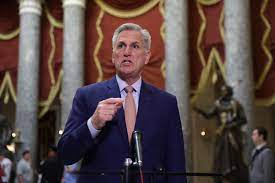U.S. House Speaker Kevin McCarthy faces the biggest challenge of his speakership as he is attempting to persuade his divided Republican Party to avert a federal government shutdown in less than two weeks.

The Republican-controlled House of Representatives and the Democratic-led Senate have to pass bipartisan legislation on funding next year’s budget before the Sept. 30 deadline to avoid a government shutdown.
However, Republicans in the House have mounting differences on spending, policy and impeachment, which have persisted for months and slowed the Senate’s path forward on approving the spending bill.
A deal to temporarily fund the government that House Republicans announced Sunday is already facing pushback from hard-right members of their own party, The Washington Post reported on Monday.
As of Monday morning, at least a dozen Republicans had publicly expressed opposition to the continuing resolution negotiated by members of two GOP factions over the weekend.
The proposed legislation would keep the government running until Oct. 31 and trigger a 1 percent cut to current fiscal levels, according to the report.
The 1 percent cut is an average for the federal budget. The Defense Department and the Department of Veterans Affairs would not receive any cuts, while other government agencies would have their budgets slashed by 8 percent until the end of October.
Some Republican hardliners criticized the short-term funding bill as “a continuation of (former House Speaker) Nancy Pelosi’s budget and (U.S. President) Joe Biden’s policies.”
On Monday, McCarthy hinted that the House would remain in session through the coming weekend, a signal that Republican leaders will need more time to build support for a government funding bill.
With GOP’s four-vote margin in the House, which could be even smaller in the coming days due to medical-related absences, challenges the House speaker faces are tough.
McCarthy cannot afford to lose much support from his party to get the necessary 218 Republican votes to pass the bill that Democrats unite in opposing, according to political observers.
House Democratic leader Hakeem Jeffries warned on Sunday that the situation amounts to a Republican “civil war.”
But like the defense bill, which the White House has already threatened to veto, the short-term stopgap spending bill is unlikely to succeed with Democrats and become law, according to a Reuters report.

